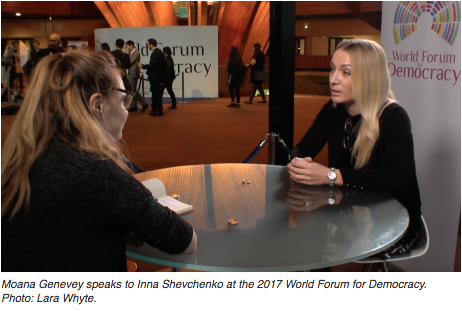Open democracy – “What populists are really afraid of is pluralism” says FEMEN activist Inna Shevchenko, who argues that democracy and feminism are interlinked.
“When you fight for women’s rights, and when you advocate for women’s rights, you necessarily, immediately, advocate for democracy,” says FEMEN activist Inna Shevchenko.
Democracy, she argues, “is not only about counting silent hands” – it is about pluralism, and allowing the confrontation of different opinions. “It’s about hearing many, many voices and, of course, necessarily, hearing women’s voices.”
Shevchenko spoke to us on the sidelines of last year’s World Forum for Democracy in Strasbourg. The theme for the November 2017 event was: ‘‘Is Populism a Problem?” The prominent feminist from Ukraine had a clear answer: populists are “one of the main obstacles for progress of women’s rights.”
Populists aim to divide society and “create clashes between groups” by reducing people “to only one identity,” she said. They also manipulate societies, Shevchenko argued, by playing on individuals’ fear and insecurity. But, she insisted: “we don’t need more fear and more insecurity, we had it enough as women, we don’t need it anymore.”
“What we need is actually answers to our fears,” she added. “Now is the time, this time of disruption, is actually a time to come together. Populists aim to divide us but it’s a time when we have to aim for unity.”
So how can women fight back? “I think that it’s women’s turn to speak out, it’s women’s turn to occupy public space, to make women’s voices heard,” Shevchenko said. “It’s been for too long that we were silenced, we were pushed in the corner, we were not visible. It’s our turn and we have to take this space.”
And this is already happening: women around the world are shining light and breaking silence on taboos and issues that have been “ignored for too long,” she said. “For me, as a fellow woman, this is something that makes me feel even stronger and more powerful.”
“We see solidarity, with all the differences we have…the diversity of women all over the world. But today we hear these voices of women in which we can actually recognise each other. We can relate to the stories that we hear, we can relate to the complaints that we hear.”
“We have to show solidarity to one another and we have to continue making our own proper voices also heard. Because what populists are really afraid of is pluralism. And women’s voices, when they join public debate, they necessarily push for more pluralism.”


